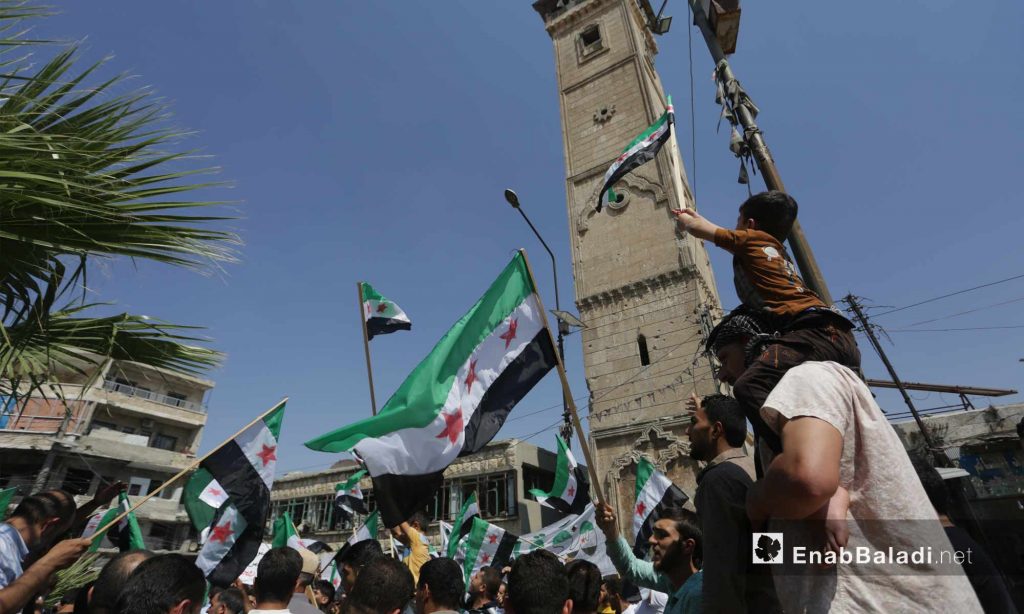Maarat al-Numan is one of the largest cities in the southern countryside of Idlib and known as the city of Abul Alaa’ Al- Ma’arri, the great poet famed for his book, “Epistle of Forgiveness.”
Maarat al-Numan is also a major transportation node through which the M5 international highway passes, linking the north and south of the country and reaching to the Jordanian border. Russian troops along with the Syrian government troops have been engaged in fierce battles to take control over the areas along the M5 highway, including Maarat al-Numan.
Maraat al-Numan has been subjected to intense airstrikes carried out by Russian-backed Syrian regime forces for the past four days, deliberately targeting bare essentials of life and civilian infrastructure: the Syrian Civil Defense (SCD), public markets, the electricity company of the city, and first-aid center, according to the SCD’s statement.
A humanitarian catastrophe in Maraat al-Numan threatens the lives of more than 100,000 civilians as ongoing Russian and Assad airstrikes continue unabated in the city, even targeting the vehicles of civilians who attempt to flee the violence in search of shelter outside the danger zone.
Battle for the strategic city
The government of the Syrian regime is thought to be preparing for a ground offensive to take control of the strategic city of Maraat al-Numan.
The M5 highway, which runs through Maraat al-Numan, lies about 300 km (186 miles) from Damascus, 80 km (49 miles) from Aleppo, and 60 km (37 miles) from Hama province.
Maraat al-Numan is located near the largest military camps of the Syrian regime. Moreover, the strategic location of Maraat al-Numan, made it one of the main targets of Russia, that sought to impose control over it. Russian interest in the town was apparent in its earlier military operations in the region between June and August 2019, during which it gained control over the nearby Khan Sheikhoun. It was also or through the agreements signed with Turkey, especially the “Sochi” agreement, on 17 September, 2018, which governs the fate of Idlib province and its geographical borders.
The fate of the city also depends on the Turkish-Russian understandings regarding the province of Idlib. The Sochi agreement of 2018, in addition to the creation of a demilitarized zone, provided for the preparation of clearing “M4” and “M5” international highways, which to date Russia has failed to secure. Therefore, Russia decided to go to the military option and hit the areas bordering the strategic highways.
Historical city
Maarat al-Numan witnessed the rise and fall of many states and civilizations, it was under the control of the Byzantine Empire, the Fatimids, and was the site of an infamous siege during the Crusade.
Maarat al-Numan gave its name to its most prominent poet, Abul Alaa’ Al- Ma’arri who was born and is buried there.
Historical and cultural monuments of national significance are located in the city, such as Murad Pasha Caravansary (now the Museum of Maraat al-Numan), Great Mosque, Maqam Masjid Nabi Yusha, al-Nurya Madrasa, the statue of al- Ma’arri and his tomb—which was damaged by shelling—and Maraat al-Numan Cultural Center which was built in the 1940s.
Maarat in the revolution
Maraat al-Numan stood out among the revolutionary cities in Syria in 2011. In June of the same year, 11 civilians in the city died in a massacre committed by regime helicopters.
The opposition established control over Maraat al-Numan since late 2013; a number of “Free Army Factions” controlled the city in sequence before Hay’at Tahrir al-Sham (HTS) expelled them and gained controlled the city.
Maraat al-Numan has experienced several incidents and repeated shelling, especially during the recent military operations launched by the Syrian regime in southern Idlib.

